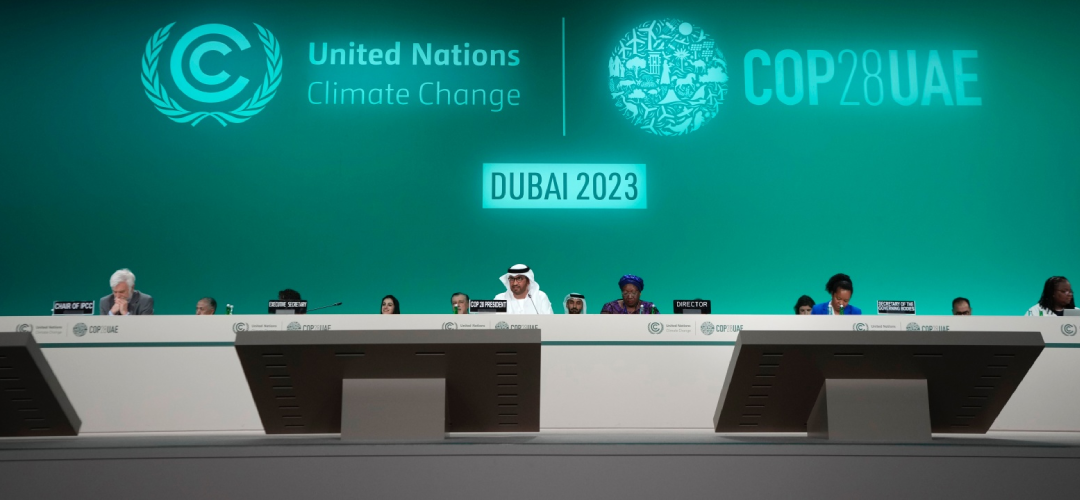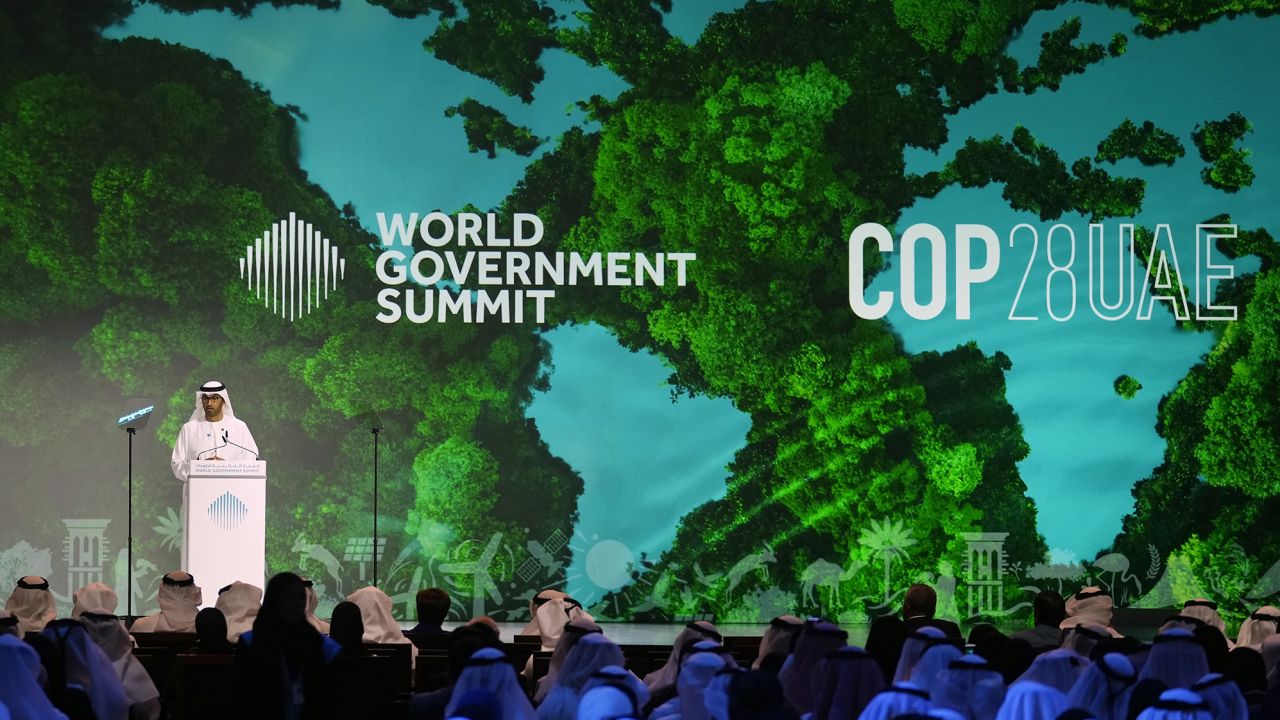COP-28: Rekindling Optimism
December 2, 2023 | Expert Insights

The annual 'jamboree' on climate change is around the corner again, this time in the glitzy desert city of Dubai from November 30 to December 12, 2023.
The 28th Conference of the Parties (COP) to the United Nations Framework Convention on Climate Change (COP28) is being hosted by the United Arab Emirates (UAE). The summit anticipates a robust participation of over 70,000 individuals, including heads of state and leaders from diverse sectors, such as business, youth, climate science, Indigenous Peoples, journalists, and other experts.
The stated focus of COP28 is to recalibrate global climate action, emphasising the acceleration of the energy transition, substantial emissions reductions by 2030 to cap global warming at 1.5°C, and a central commitment to incorporating nature, people, lives, and livelihoods into climate strategies.
COP28 holds added importance as it coincides with the inaugural "Global Stocktake," a UN-mandated assessment providing a comprehensive report card on global progress toward the goals of the Paris Agreement.
The potential impact of COP28 on global affairs can be substantial as a crucial opportunity for the international community to elevate efforts in combating climate change and to chart a decisive course of action in fulfilment of the Paris Agreement.
Background
The United Nations Framework Convention on Climate Change (UNFCCC) is credited with the inception of COP in 1995 in its inaugural Berlin session. Designed to assess member countries' advancements in mitigating climate change and evaluating the effectiveness of implemented measures, COP has progressively become a lynchpin for global climate policy and collaboration.
Critical milestones in COP's history include the establishment of the Intergovernmental Panel on Climate Change (IPCC) in 1988, laying the foundation for a comprehensive understanding of climate change. The Kyoto Protocol of 1997 set binding emissions reduction targets for industrialised nations, while the pivotal Paris Agreement of 2015 supplanted the Kyoto Protocol, introducing the imperative to limit global temperature increases to below 1.5°C above pre-industrial levels.
COP conferences have witnessed the expanding role of non-state actors, including businesses, cities, and civil society organisations, in climate action and policy. Evolving in complexity and inclusivity, these gatherings focus on addressing climate change impacts and fostering sustainable development. The host country responsible for organising and setting the agenda has rotated among various locations, including Berlin, Copenhagen, Paris, and Glasgow.
This year's agenda aims to tackle crucial issues pertaining to climate adaptation, finance, loss and damages, and the inaugural Global Stocktake synthesis report.
A word about the much-awaited Global Stocktake. It represents the culmination of the first-ever evaluation of countries' progress toward their climate goals. This assessment is expected to underscore the importance of ambitious sectoral measures, effective adaptation implementation plans, just transition policies, finance evaluations, efforts related to loss and damage, and sub-national policies. The report's focal points include identifying action gaps and providing a foundation for new emissions reduction plans, climate finance commitments, and renewable energy targets. Hopefully, name and shame would force the worst emitters to mend their ways and reward conscientious countries with greater green investments, especially in the developing world.
In the realm of climate adaptation goals, COP28 is anticipated to address transformative actions within key sectors and systems such as energy, transport, food systems, and land use. Hopefully, its outcomes delineate follow-up processes that will translate ambitious Nationally Determined Contributions (NDCs) into reality by 2025. This involves engaging in dialogues to facilitate the development of new NDCs by participating countries. Within the financial landscape of climate adaptation and loss and damages, COP28 aims to fully operationalise the ‘Loss and Damage Fund’, a consensus reached in previous COP sessions to harbour a fund dedicated to countries most affected by climate change.

Analysis
This yearly event has, to an extent, succeeded in routinising climate action, forcing the issue into the front pages of our daily newspapers and headlines of TV programmes. More importantly, behind the scenes, the COP platform sets climate agendas and norms and prioritises the environment in governments' long-term strategic policies. Moreover, the multi-stakeholder approach has presented a bottom-up regime where diverse inputs have created cross-border and cross-industry solidarities. Sadly, these political gains have not been translated into substantial climate action, as much as one would desire.
The first key issue is climate adaptation finance. This initiative is intended to be a sum of investment for climate mitigation purposes, going from developed economies to emerging ones, according to the principle of Common but Differentiated Responsibilities (CBDR). This is predicated upon the fact that developed economies have become so dependent on using fossil fuels, which emerging economies cannot exploit given the present circumstances. However, it is not easy to make developed economies concur with climate funding goals, a reality that was so much in evidence during last year's Africa Climate Summit. Of the 100 billion USD promised by 2020, only 68.3 billion USD was scraped through - that too diluted through other forms of foreign aid and purchased carbon credit points. While promises at COP are a commonplace occurrence, it is the implementation that lacks resolve when it comes to climate finance. The COVID-induced economic slowdown, the resource-eating war in Ukraine and now the Gaza conflagration make future financial commitments even more uncertain.
Secondly, it is important to consider hard statistics when it comes to decarbonisation targets. According to a study conducted by consultants at PwC, an annual decarbonisation rate of 17.2 per cent is now imperative to cap global warming at 1.5°C above pre-industrial levels. This marks a notable increase from the previous year's 15.2 per cent rate. The report emphasises that achieving this target requires a pace seven times faster than the progress made in the last year, which stood at 2.5 per cent, and a remarkable 12 times faster than the global average decarbonisation rate observed over the past two decades, which was 1.4 per cent. If the country pledges on the 2030 scenario, taking into Net Zero plans, are to be trusted, the planet is looking at a 2°C increase. However, if governments do not act, an increase of 2.6-2.9 °C becomes a real and terrifying reality!
Development incentives and demand for energy security confound the progress towards decarbonisation and sustainability, especially since the Ukraine conflict; Russia redirected and expanded oil sales whilst lowering prices, thus incentivising the two most important economies (China and India) to increase fossil fuel reliance! Moreover, Norway ramped up production in the Arctic to meet European demand. The staunch development agendas of BRICS (+6) nations and other emerging economies further confound the issue, as they expect the negligent developed bloc to cover their economic growth, according to CBDR.
Amidst all this gloom, there is a slight silver lining- the promising growth of renewables. The renewable energy industry has witnessed a substantial surge- 24.4 per cent in solar and 13.1 per cent in wind power generation, reflecting a 1.5 per cent uptick. This growth contrasts with the marginal 0.1 per cent increase in the share of fossil fuel generation, which currently constitutes 59.9 per cent of the world's energy supply.
Assessment
- Implementation of idealistic policy expectations that surface in COPs amidst contrasting goals of development and energy security is the challenge. The turbulent geopolitical situation is not helping matters either.
- The contribution of developed economies towards the Loss and Damages Fund and climate financing towards developing economies will determine whether or not an equitable, just green transition can occur. However, the developed world expects some returns for its generosity in real terms, which is currently lacking. Rampant corruption in governance in potential recipient nations does not help remove the mutual trust deficit.
- The growth in the renewable energy sector presents an opportunity to work on demand-side sustainable development supported by profit-seeking market signals. This needs to be exponentially increased by businesses, start-ups, and policymakers.








Comments